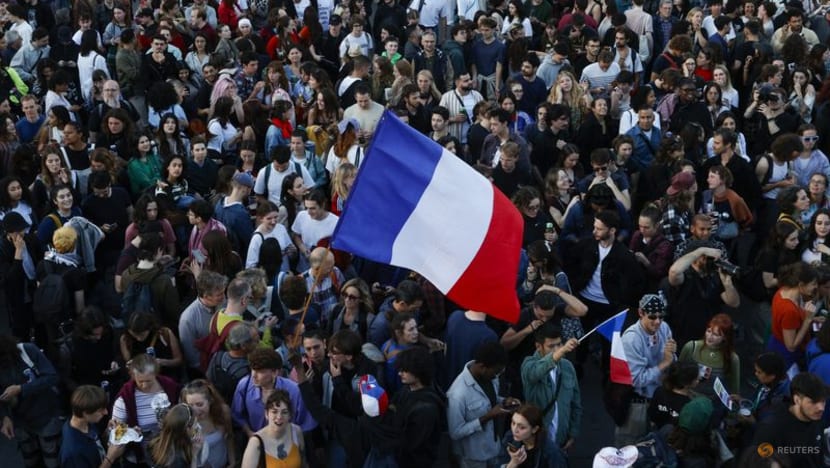Commentary: France heads back to its postwar era of ungovernability
The far right's defeat in France's parliamentary election could prove a temporary setback, says Financial Times’ Ben Hall.

People hold French flags as they gather at the Place de la Republique after partial results in the second round of the early French parliamentary elections, in Paris, France, on Jul 7, 2024. (Photo: REUTERS/Abdul Saboor)
LONDON: “Our victory is only postponed.” Marine Le Pen put a brave face on the defeat for her far-right Rassemblement National party in France’s parliamentary election on Sunday (Jul 7).
In reality, third place for the RN, according to provisional results, is a bitter disappointment. The party thought it would finally have the opportunity to show the French people it could govern, giving the party a springboard for the more important 2027 presidential election. But French voters turned out in droves to stop them.
One reason was that the RN proved to be not so detoxified, fielding candidates with extremist backgrounds or a record of racist and antisemitic statements.
But more importantly, France’s so-called republican front – the willingness of its centrist and leftwing parties to join forces to thwart the far-right’s rise to power – proved resilient. The RN depicts this as a cynical game by the political establishment to lock it out of power. Voters, though, went along with it.
That alone will allow President Emmanuel Macron to argue that his election gamble (his allies prefer to call it a rational strategy worthy of Descartes) in the end paid off. He can say he broke the populist fever gripping the country, interrupting the far-right’s seemingly inexorable rise.
Furthermore, his Ensemble alliance of centrist parties has performed considerably better than expected, coming in a strong second place. That keeps the centrists in the political game when at one stage they appeared to be heading for a rout.
TURNING BACK THE CLOCK
However, Macron wanted a snap election with a lightning three-week campaign to be a moment of political “clarification” for France. It has provided anything but. Voters showed what they were against but not what they were for.
The country now faces months, possibly years, of political uncertainty and unstable government. That in itself is bad news for France and its European partners.
France seems to be turning the clock back to the 4th Republic, the politically volatile postwar period when the presidency was weaker and a raucous parliament was supreme.
In the past few weeks power has drained away from the Elysee palace to the National Assembly. A hitherto micromanaging president has been relegated to a back-seat role – symbolically, he made no appearance on Sunday night, instead issuing a statement saying he would await the “structuring” of forces in parliament before taking the “necessary decisions”.
Furthermore, Sunday’s vote was above all a victory for the leftwing Nouveau Front Populaire, formed in four days behind a radical tax-and-spend programme after Macron’s shock dissolution of parliament.
It was the left that spearheaded an electoral pact to bar the far-right, which saved scores of seats for the centrists. After the first round it swiftly withdrew its third-placed candidates from three-way contests in seats across the country to prevent a split in the anti-RN vote, while the leaders of Macron’s alliance prevaricated (although their candidates did mostly follow suit).
AN UNGOVERNABLE FRANCE
As the largest bloc, the NFP will lay claim to the premiership and the right to form a government. That will be enough to unnerve markets, given its planned massive spending increases financed, in theory, by swingeing tax rises on the wealthy.
Jean-Luc Melenchon, the belligerent leader of the far-left La France Insoumise, the biggest of the four parties in the NFP, said there could be no compromise on the left’s programme. But the NFP will fall well short of a governing majority. Suggestions on Sunday that it could implement its plans by decree smack of election night exuberance.
Macron’s camp is hoping that the left will eventually fragment under the strain of Melenchon’s intransigence and that it could then try to assemble some sort of coalition with the socialists, greens and other moderates. This could take weeks if not months.
Even if the numbers add up, and it looks a stretch, the centre-left are likely to ask a high price – such as reversing Macron’s rise in the pension age from 62 to 64 or reimposing a wealth tax on financial assets – and will want the government under their control.
If there is no path to a majority, Macron may have to install a caretaker premier with a minimal mandate until fresh elections can be called in one-year’s time. With three more or less evenly sized political blocs unwilling to work with each other, France seems ungovernable.
Throughout the forthcoming turmoil we can expect Le Pen and her number two Jordan Bardella to present themselves as the only alternative offering order and stability. Sunday’s defeat may then only look like a temporary setback.














